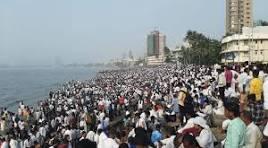
Points: 1. Growing population of India
2. Merits and demerits of a large population
3. Impressive GDP growth rate of India
4. Developing strategies to put the vast human resource to effective use
5. Conclusion
Population of India crossed 100 crore mark in 2011. Now, as per the estimates, our population is about 125 crores. With this huge population, we hold second position as the most populated nation in the world, next only to China. However, considering the rate at which our population is growing, within a few years, we will overtake China.
Many social scientists blame India’s overgrown population for the country’s social and economic problems. It is true that a nation’s large and growing population can hamper its progress and development. However, with proper planning, a huge population can prove to be a nation’s biggest asset as well.
For the all-round progress of a large nation, it is essential that all the people contribute significantly in various sectors of the economy like agriculture, production and other industries and service.
The talented and hardworking people of a nation can emerge as a highly competitive human resource. A country moves forward largely on the strength of its talented, educated and enterprising manpower. Many nations, like Japan and Israel, have proved it. These nations are poor in natural resources: they lack land and other natural resources such as minerals, metals and water; various sources of energy like natural gas and crude oil. But these nations have showed that the population could be transformed into a valuable human resource of a nation.
India is also making the most productive use of its large population. Harnessing the talents and hardwork of its people, India is emerging as an advanced and economically superior nation of the world. Our GDP growth in the last decade was impressive by any standards.
Further, our huge population of young people have made India a nation that finds respect worldwide. A few million young people graduate every year in India, a sizeable section of them in professional disciplines. Very few nations of the world can boast of such a feat.
These highly talented and educated people are proving valuable by providing their expertise and technical and non-technical know-how to various industries and vocations. Thus they are contributing to the overall growth of India in a significant way. Incidentally, Indian people have cornered a lucrative share of the worldwide outsourcing business to become a leading player in this sector. India’s closest competitors like the Philippines and South Africa are way behind India, as they lack the large human resource that India boasts of.
We have to excel in many fields by making the most imaginative use of our large human resource. However, in primary sector of the economy, i.e., agriculture our growth in the last two decades has slowed down. The main reasons for this is lack of technical expertise in agriculture and paucity of funds needed for promoting agriculture using scientific methods on a large scale. Further, the young generation in rural areas has lost interest in agriculture. They feel working in urban areas is respectful and migrating in large numbers. The inability of the old generation engaged in agriculture in rural areas to put to good use the available modern methods and techniques have led to poor agricultural yield time and again. If young generation in rural areas is motivated to develop interest in agriculture and trained and equipped in agricultural knowhow, the nation would achieve excellence in agriculture sector.
When the technical expertise and hardwork of a small section of the population has earned India the status of a software giant imagine what it can achieve if its entire young population is turned into a valuable human resource! For this to happen, first of all, primary education should be given the thrust to lay solid foundation at an early stage, for future development of the individuals.
Secondly, greater efforts must be made to end discrimination on the basis of religion, sex, caste as it makes the discriminated lot of the society unable to perform quality productive work. As the third step, the government should consider the people as the biggest asset of the nation and provide suitable opportunities to them for developing as the most valuable resource.
Even though lately, some efforts are being made in this direction, a lot more still needs to be done. By emphasising more on vocational and technical education, India could turn our educated people into a more productive human resource. The effort in general requires identification of areas and developing strategies to put the vast human resource we possess to effective use. If all the people are made to play a significant role in the nation-building process, then the nation will progress in a remarkable way. *ZZZ*
